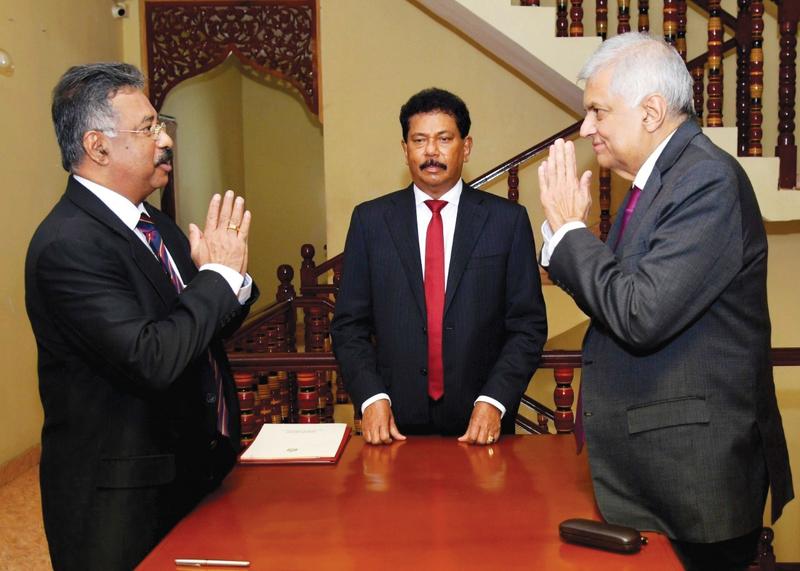 Ranil Wickremesinghe (right) greets Chief Justice Jayantha Jayasuriya during his oath-taking ceremony as acting president in Colombo on July 15. On July 20, Sri Lanka’s parliament elected Wickremesinghe as president. (SRI LANKAN PRESIDENT’S OFFICE / AP)
Ranil Wickremesinghe (right) greets Chief Justice Jayantha Jayasuriya during his oath-taking ceremony as acting president in Colombo on July 15. On July 20, Sri Lanka’s parliament elected Wickremesinghe as president. (SRI LANKAN PRESIDENT’S OFFICE / AP)
The eighth Executive President of Sri Lanka Ranil Wickremesinghe took his oath at the parliament complex on July 21 and a new prime minister-led Cabinet is taking shape, opening a new chapter for the island nation that has been beset by months-long public protests amid a huge economic crisis.
Sri Lankan lawmakers elected acting president and six-time prime minister Wickremesinghe as the nation’s new president on July 20.
Analysts, however, say the new government will not find it easy to bring quick resolution to the people’s economic woes, which include shortages of fuel, food and medicines. Winning people’s trust and restoring stability can also be a challenge.
After winning the election, Wickremesinghe addressed the parliament, calling on all legislators including the opposition members to unite and work together with him to lead the nation out of the current economic crisis.
“We are at a critical juncture. There is an economic crisis and the youth want a system change. People want all parliamentarians to come together,” he said.
In a parliamentary vote, Wickremesinghe — who has been serving as acting president following the departure of former top leader Gotabaya Rajapaksa — defeated his main rival, five-time lawmaker Dullas Alahapperuma, by a substantial margin.
In the July 20 vote, 223 members cast their ballots in the 225-seat Sri Lanka parliament to elect a new president. Wickremesinghe won the contest by securing 134 votes, against Alahapperuma’s 82.
A third contender, National People’s Power leader Anura Kumara Dissanayake, secured just three votes, while four votes were deemed invalid.
“Regardless of who won, we must ensure that the necessary economic and political changes that people want are met. Overcoming the crisis should be the first and foremost task of parliamentarians,” Alahapperuma said after the election.
Sri Lanka has witnessed its worst post-independence economic crisis in recent months, with fuel and food shortages prompting people to take to the streets. The Russia-Ukraine conflict has exacerbated economic woes that had already been grave due to the COVID-19 pandemic, which badly dented tourism.
Bernard Goonetilleke, chairman of the Sri Lankan think tank Pathfinder Foundation, said the new administration’s first challenge will be to win the confidence of the people.
“Second will be to bring the economy back to its feet, which is very much damaged,” he said. “It is going to be a long-term exercise. It cannot be done overnight or within a short period of time.”
However, Chulanee Attanayake, a research fellow at the Institute of South Asian Studies, National University of Singapore, said Wickremesinghe was seen as “an associate of the Rajapaksa administration”, and there could be some reaction from the public following his election as the president.
Hopefully, Sri Lanka will be able to see some kind of stability by the end of next year, she said.
“It will all depend on the coming government, their policies, how people will react to those policies. So, a lot of things ... a lot of variables,” she said.
To come out of the crisis, in the short term, Sri Lanka still has to negotiate with the International Monetary Fund and seek an immediate bailout, Attanayake said.
“Then, of course, there should be policies mid-term and long-term to stabilize the economy, improve exports… and to diversify avenues for gaining forex, and to attract foreign direct investment which is highly necessary for the country,” she said.
Ahilan Kadirgamar, a political economist and senior lecturer at the University of Jaffna, also said the government can try to reach an agreement with the IMF for a bailout, but if it is going to mean “more austerity, more cuts” things could get difficult, Kadirgamar said, adding: “People can’t take any more suffering”.
Whoever is in power, it will be extremely difficult to manage the situation, he said. “We need to come up with a better leadership, because without a leadership that people trust we can’t lead the people out of this crisis,” Kadirgamar said.
He said that there will be a very difficult time for Sri Lanka, not just over the next year, but for many years.
Xinhua contributed to this story.


